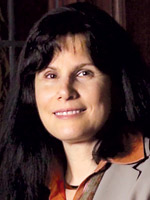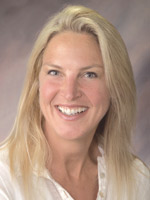Chancellor Names 2010 Distinguished Research Award Winners
University of Pittsburgh Chancellor Mark A. Nordenberg has announced the winners of the 2010 Chancellor’s Distinguished Research Awards. The awards will be given to the following five Pitt faculty members:
 Susan G. Amara
Susan G. AmaraSusan G. Amara, Thomas Detre Professor of Neuroscience and chair of the Department of Neurobiology in the University of Pittsburgh’s School of Medicine and codirector of Pitt’s Center for Neuroscience;
 Thomas C. Hales
Thomas C. HalesThomas C. Hales, Mellon Professor of Mathematics;
 Colin MacCabe
Colin MacCabeColin MacCabe, Distinguished Professor of English and Film;
 Elodie Ghedin
Elodie GhedinElodie Ghedin, assistant professor in the Division of Infectious Diseases, Pitt School of Medicine; and
 Laura J. Niedernhofer
Laura J. NiedernhoferLaura J. Niedernhofer, a professor in the Department of Microbiology and Molecular Genetics, Pitt School of Medicine, and Molecular and Cellular Oncology Program, University of Pittsburgh Cancer Institute.
Amara, Hales, and MacCabe were honored in the senior scholar category, which recognizes “an outstanding and continuing record of research and scholarly activity.” Ghedin and Niedernhofer were honored in the junior scholar category.
Awardee will receive $2,000 cash prizes and $3,000 grants for the support of their research and teaching. The awardees will be recognized during Pitt’s 34th annual Honors Convocation on Friday, Feb. 26, and their names will be inscribed on plaques to be displayed in the William Pitt Union.
Amara is internationally renowned for her seminal contributions in two separate fields. Early in her career, she conducted groundbreaking research on alternative splicing of mRNAs, permitting a single gene to give rise to multiple products. Amara pushed her gene-expression techniques to the next level and became the first to clone two major classes of transporters, which are the molecular machines that take up neurotransmitters after their release. These transporters are essential for the inactivation of synaptic transmission and, as such, are important targets for such drugs as antidepressant medications.
“Your efforts have been recognized through a number of prestigious appointments, including service as a Howard Hughes Senior Investigator, receipt of a [National Institutes of Health] Merit Award, election to both the National Academy of Sciences and the American Association for the Advancement of Science, and your recent appointment as president-elect of the Society for Neuroscience,” Nordenberg wrote in his letter to Amara notifying her of the award.
In his letter to Hales announcing the award, the chancellor said the selection committee “noted that you have made seminal contributions to a broad range of areas of mathematics, including discrete geometry, algebra, and formal theorem proving. You are internationally recognized for solving a number of mathematical problems that have stymied scientists for decades, if not centuries.”
Hales is universally recognized as having solved the oldest and most difficult open problem in discrete geometry, Kepler’s Conjecture from 1611. The complexity of the proof for Kepler’s Conjecture was such that it took a panel of 12 reviewers convened by the Annals of Mathematics several years to check its correctness. In addition, Hales settled the ancient Honeycomb Conjecture and supervised the solution to the challenging Dodecahedral Conjecture. “The proofs of these three conjectures are considered to be among the most significant breakthroughs in discrete geometry in the 20th century,” Nordenberg wrote.
MacCabe is considered by many to be the world’s foremost authority on the life and work of filmmaker Jean-Luc Godard; he is also a major figure in the British Independent Cinema movement of the late 1980s and 90’s, when he produced critically acclaimed films and television documentaries and served as the head of production and head of research for the British Film Institute. MacCabe has also served on juries of several major film festivals, including the Cannes and Vancouver festivals. In addition, he has authored 12 books, edited 14 collections, and published more than 100 essays, chapters, prefaces, and introductions.
In his letter notifying MacCabe of his award, Nordenberg lauded him for playing “a central role in interdisciplinary initiatives in Arts and Sciences, including the development of Pitt’s Cultural Studies Program. You have also been instrumental in bringing leading artists and intellectuals to our campus, such as Salman Rushdie, Tilda Swinton, and Cornell West.”
Ghedin is a scientist whose research has made a significant impact in two key areas of infectious disease: parasite and viral genomics. She has focused her efforts on the study of neglected infectious diseases like African sleeping sickness, Chagas disease, and leishmaniasis which afflict millions in poor and underdeveloped countries. “In the future, your research may allow for the prediction of viruses that may emerge in future populations, where such emergence is mostly likely to occur, and which species are most likely to act as reservoirs,” Nordenberg wrote in his letter informing Ghedin of her award.
Ghedin came to Pitt in 2006, after spending six years at The Institute for Genomic Research in Rockville, Md., where she initiated and led the Viral Genomics Group.
Niedernhofer is a faculty member studying the health impact of DNA damage and its contribution to aging and age-related diseases. “As a postdoctoral student, your work yielded definitive experimental evidence that DNA damage promotes aging in mammals and induces a systemic endocrine response that extends lifespan. At the University, you are using the models you developed to test the hypothesis that diverse age-related diseases may be caused by a common mechanism,” Nordenberg wrote in his letter to Niedernhofer announcing her award.
Other Stories From This Issue
On the Freedom Road

Follow a group of Pitt students on the Returning to the Roots of Civil Rights bus tour, a nine-day, 2,300-mile journey crisscrossing five states.
Day 1: The Awakening
Day 2: Deep Impressions
Day 3: Music, Montgomery, and More
Day 4: Looking Back, Looking Forward
Day 5: Learning to Remember
Day 6: The Mountaintop
Day 7: Slavery and Beyond
Day 8: Lessons to Bring Home
Day 9: Final Lessons

